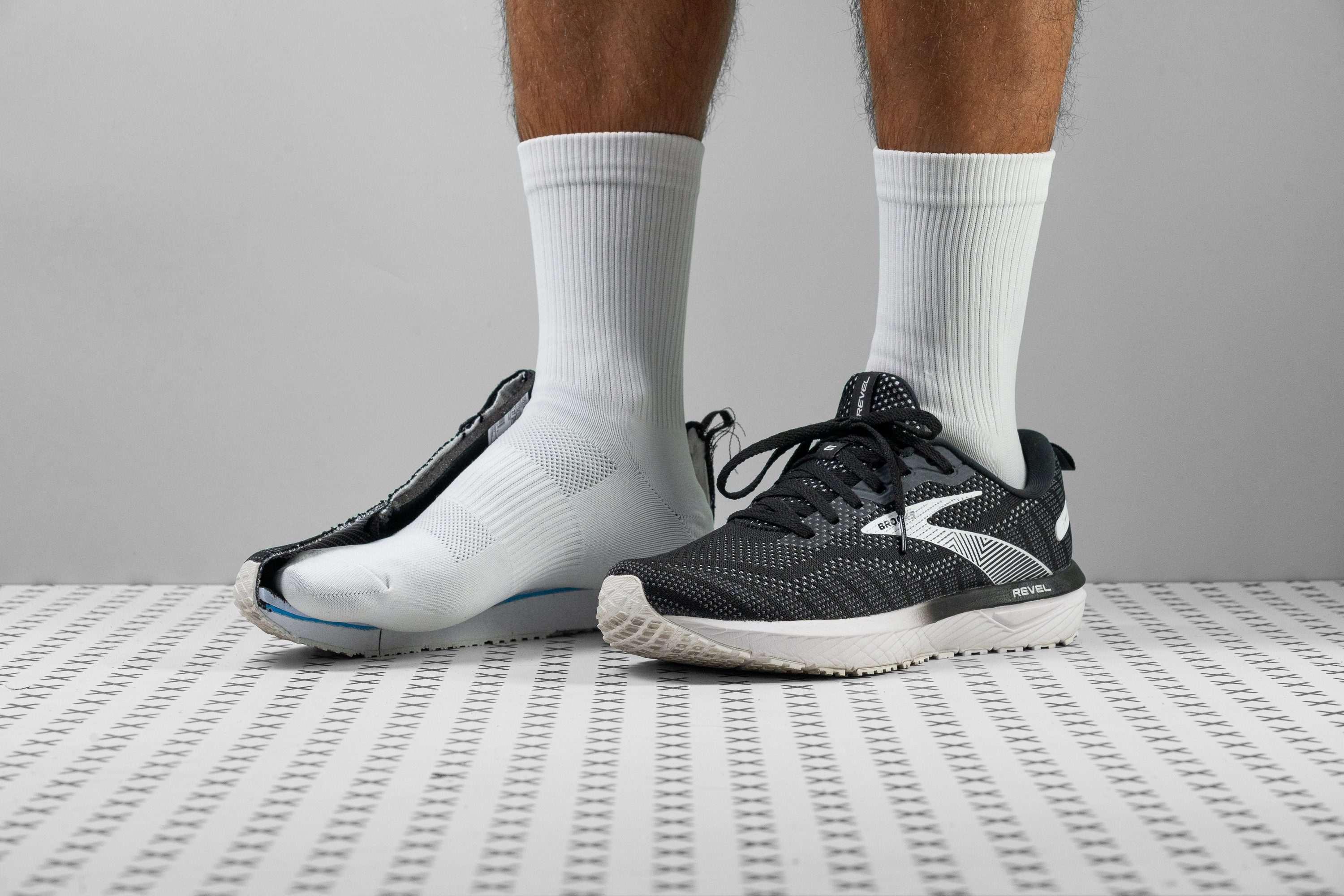Our verdict
- Top pick in best cheap running shoes (2023)
- Top pick in best tempo shoes (2023)
Pros
- Light on the foot
- Can pick up the pace
- Provides good stability
- Flexible and comfortable underfoot
- Above average breathability
- Durable outsole
- Budget friendly
- Doubles as a comfy walking shoe
Cons
- Not for long runs
- Lacks traction on certain surfaces
Audience verdict
Comparison
The most similar running shoes compared
+ + Add a shoe | |||||
|---|---|---|---|---|---|
| Audience score | 86 Good! | 77 Decent! | 75 Bad! | 76 Decent! | |
| Price | $100 | $75 | $100 | $100 | |
| Pace | Daily running | Daily running | Daily runningTempo | Daily running | |
| Shock absorption | - | Moderate | Moderate | Moderate | |
| Energy return | - | Low | Low | Low | |
| Traction | - | Moderate | High | Moderate | |
| Arch support | Neutral | Neutral | Neutral | Neutral | |
| Weight lab Weight brand | 9.2 oz / 261g 8.8 oz / 249g | 9.3 oz / 265g 9.4 oz / 267g | 8.6 oz / 244g 8.7 oz / 246g | 9.1 oz / 257g 9 oz / 255g | |
| Lightweight | ✗ | ✗ | ✓ | ✗ | |
| Drop lab Drop brand | 13.2 mm 10.0 mm | 10.1 mm 10.0 mm | 9.9 mm 8.0 mm | 11.9 mm 12.0 mm | |
| Strike pattern | Heel | Heel | HeelMid/forefoot | Heel | |
| Size | True to size | Slightly small | Slightly small | True to size | |
| Midsole softness | Balanced | Balanced | Balanced | Balanced | |
| Difference in midsole softness in cold | Big | Small | Small | Small | |
| Toebox durability | Bad | Decent | Decent | Bad | |
| Heel padding durability | Bad | Good | Decent | Good | |
| Outsole durability | Good | Good | Decent | Good | |
| Breathability | Moderate | Moderate | Moderate | Moderate | |
| Width / fit | Narrow | Medium | Medium | Medium | |
| Toebox width | Medium | Medium | Medium | Medium | |
| Stiffness | Stiff | Moderate | Moderate | Moderate | |
| Torsional rigidity | Stiff | Moderate | Moderate | Moderate | |
| Heel counter stiffness | Stiff | Moderate | Stiff | Stiff | |
| Heel lab Heel brand | 32.9 mm | 32.2 mm 32.0 mm | 33.2 mm 32.0 mm | 34.1 mm 34.0 mm | |
| Forefoot lab Forefoot brand | 19.7 mm | 22.1 mm 22.0 mm | 23.3 mm 24.0 mm | 22.2 mm 22.0 mm | |
| Widths available | Normal | NarrowNormalWideX-Wide | NormalWide | NormalWide | |
| Orthotic friendly | ✓ | ✓ | ✓ | ✓ | |
| Season | All seasons | All seasons | All seasons | All seasons | |
| Removable insole | ✓ | ✓ | ✓ | ✓ | |
| Ranking | #416 Bottom 39% | #351 Bottom 8% | #362 Bottom 5% | #355 Bottom 7% | |
| Popularity | #333 Top 49% | #57 Top 15% | #78 Top 21% | #148 Top 39% |
Who should buy
We recommend the Revel 6 to:
- Casual runners who want for a daily shoe that is capable of some speedwork
- Runners looking for a cheap but solid shoe to add to their roster for easy days
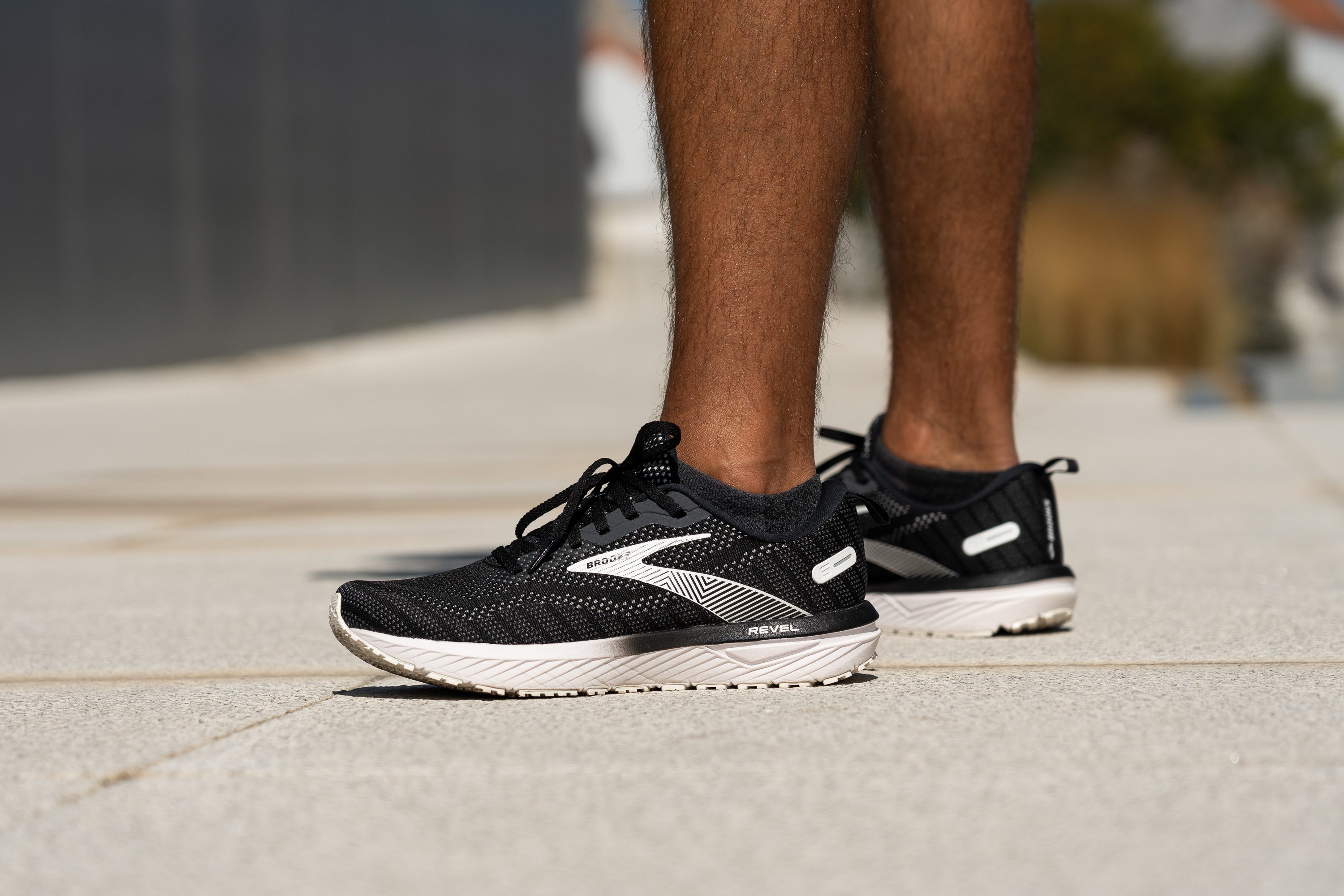
Who should NOT buy
When it comes to covering long distances, the Revel 6 definitely falls short. For a shoe that’s better suited for those long-haul efforts, we recommend the slightly more expensive Brooks Launch 10 instead.
Advanced runners might find the no-frills nature of the Revel 6 underwhelming. For a daily trainer that provides a more premium-feeling ride we suggest checking out the Brooks Glycerin 20 instead, which also provides better traction on smooth or wet surfaces.
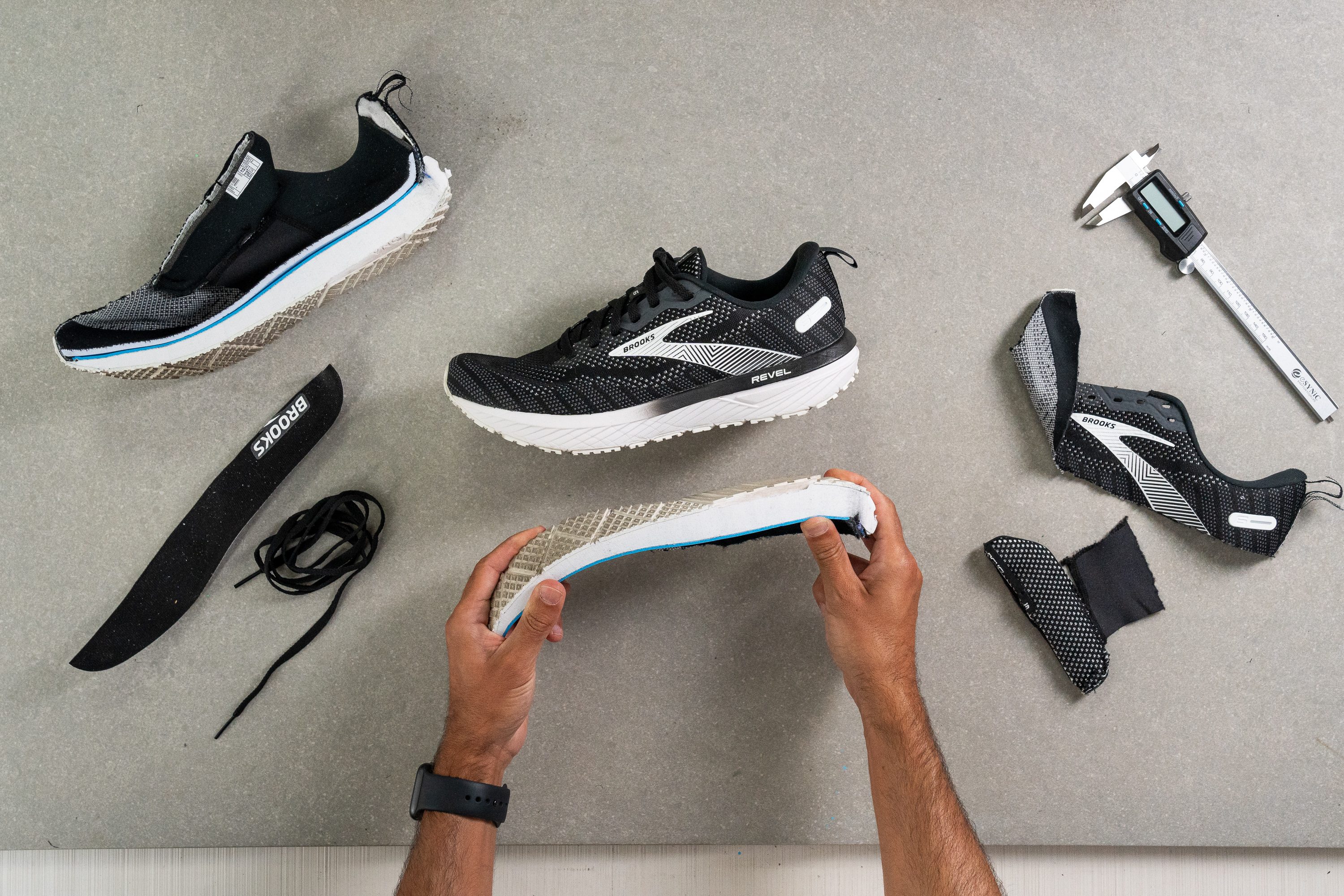
Cushioning
Heel stack
The Revel 6 boasts a heel stack of 32.9 mm based on our caliper measurements which is slightly higher than our lab average as well as the 31 mm officially stated by Brooks. We do measure the stack including the shoe’s insole which may account for this disparity. This stack height means that the midsole provides ample cushioning for comfortable heel landings
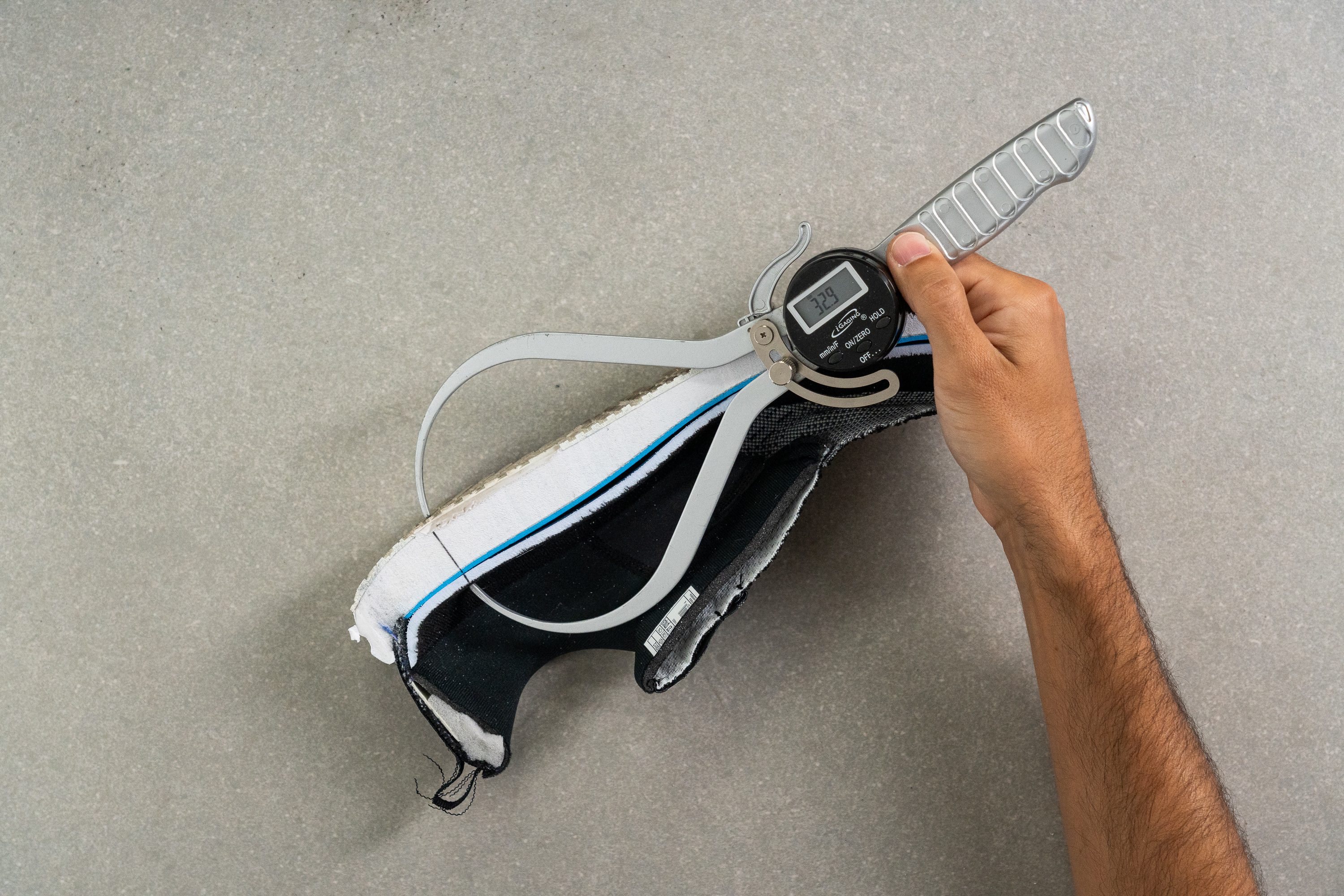
| Revel 6 | 32.9 mm |
| Average | 34.8 mm |
Forefoot stack
We found a similar inaccuracy when measuring the Revel 6’s stack at the forefoot. While Brooks markets the shoe as having a 21 mm drop at the forefoot, we measured it to be shorter at 19.7 mm. While this is also quite a bit shorter than our lab average, the Revel 6 still feels adequately cushioned for most day-to-day runs.
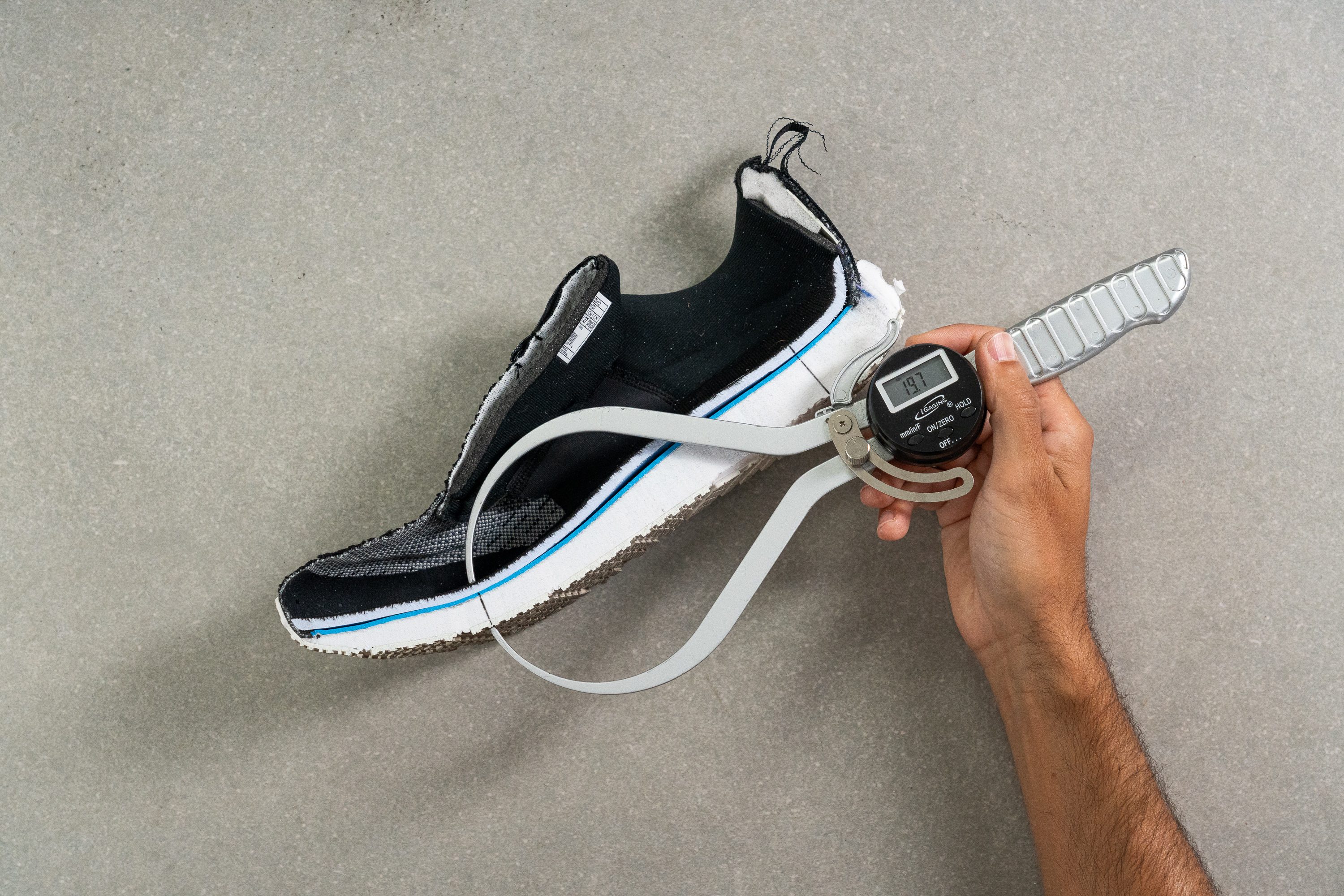
It’s only when going the distance that forefoot strikers will yearn for that extra bit of foam underfoot. For a shoe that provides more forefoot protection for those long haul days, we suggest looking at the Brooks Launch 10 or the ASICS Gel Nimbus 25 instead.
| Revel 6 | 19.7 mm |
| Average | 26.2 mm |
Drop
While the Revel 6 is stated to have a heel drop of 10 mm, our accurate stack measurements leave us with a drop height of 13.2 mm. This still classifies the Revel 6 as a high drop shoe which definitely favors runners with a heel striking stride.
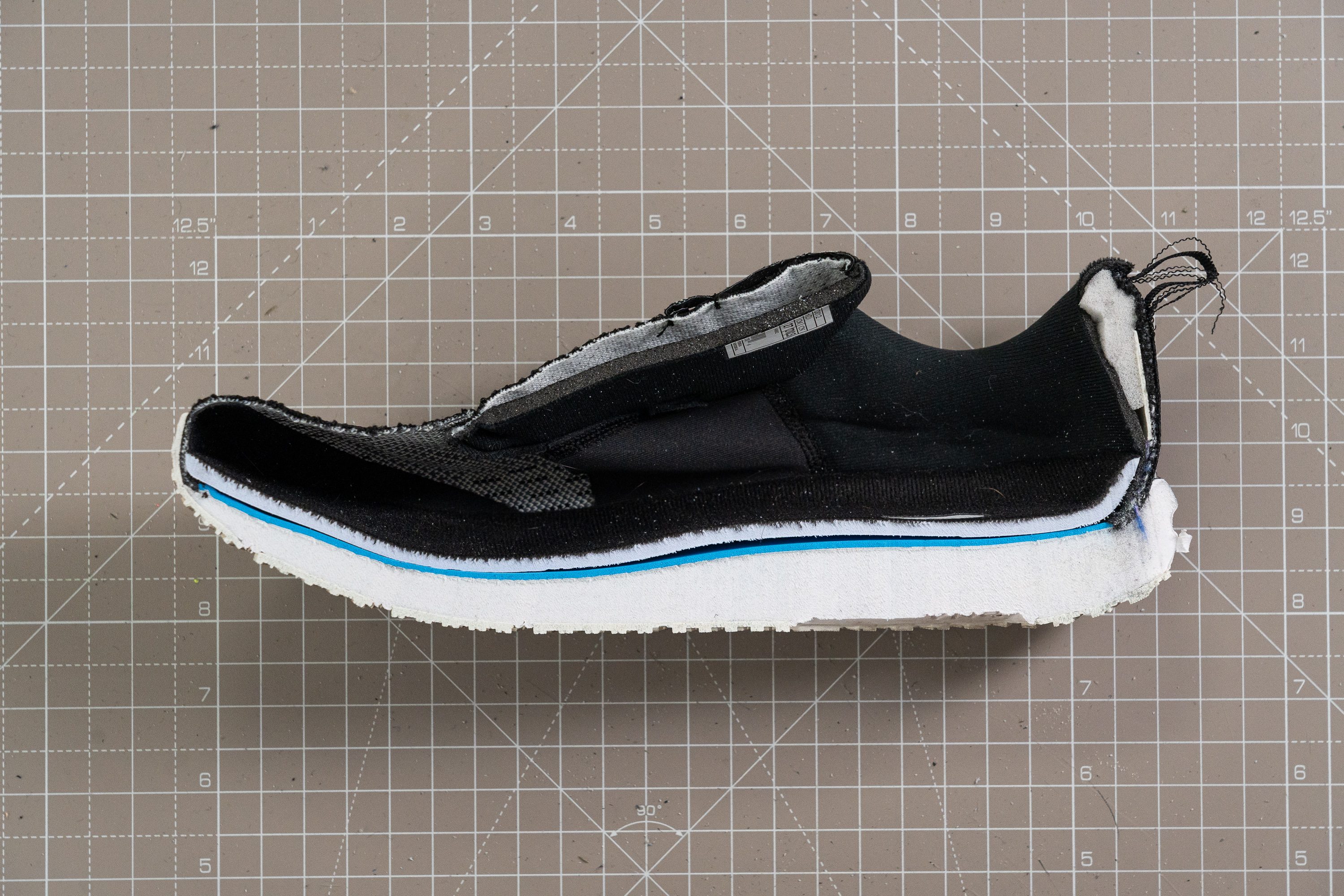
The shoe’s mild rocker means that forefoot strikers will still enjoy smooth heel-to-toe transitions in the Revel 6, but for those who prefer shoes with a less dramatic drop, we recommend checking out the Adidas Supernova+ or the Hoka Mach 5 as alternatives.
| Revel 6 | 13.2 mm |
| Average | 8.6 mm |
Midsole softness
With a reading of 20.4 HA when we pressed our durometer against the shoe’s midsole foam, the Revel 6 falls in that threshold between balanced and plush cushioning. While this is quite a bit softer than our current lab average, the Revel 6 didn’t feel overly squishy during our test runs, instead we enjoyed a ride that feels as protective and lively as we would expect from a more premium shoe!
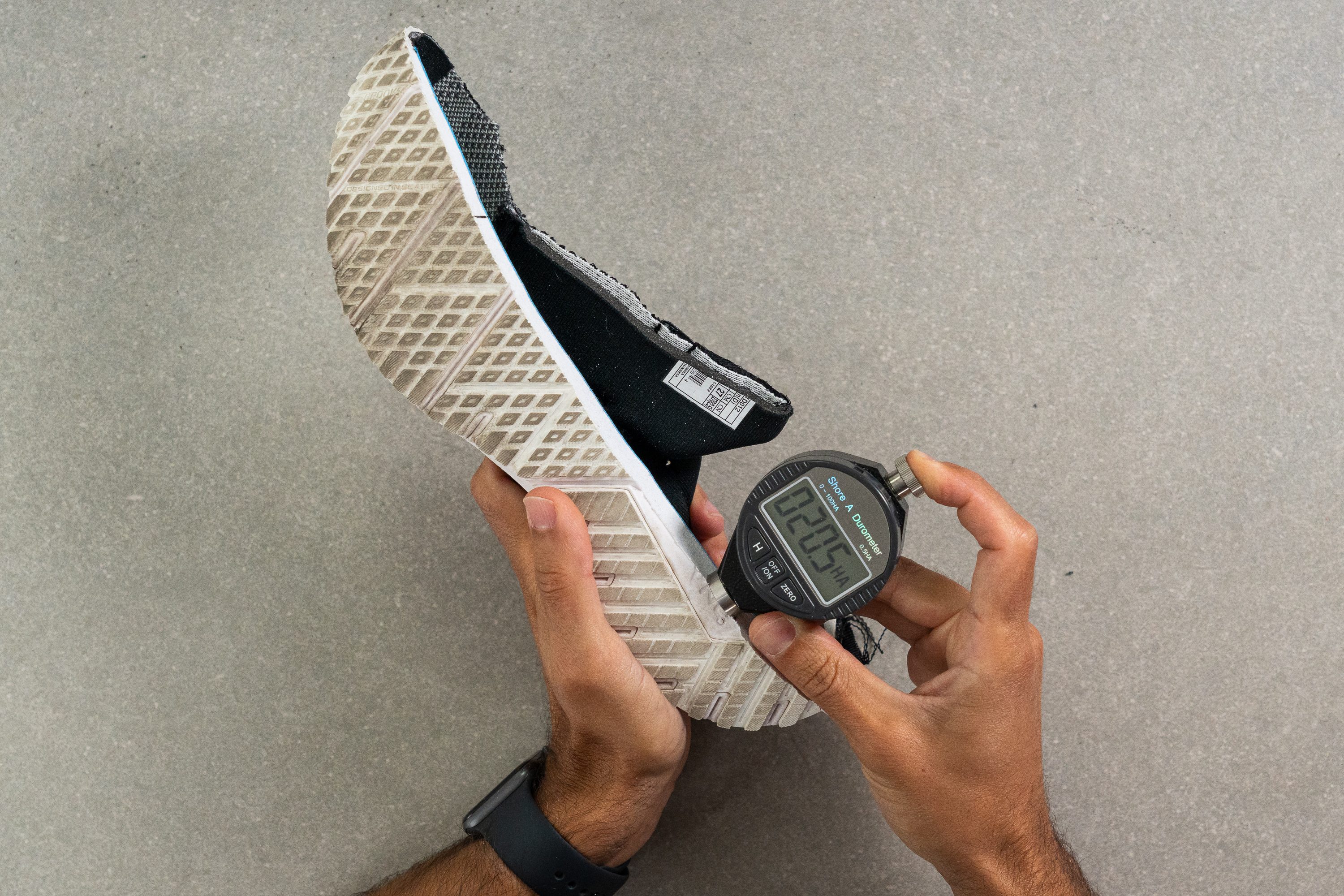
| Revel 6 | 20.1 HA |
| Average | 20.4 HA |
Size and fit
Size
Brooks Revel 6 fits true to size (553 votes).
Internal length
| Revel 6 | 262.1 mm |
| Average | 269.4 mm |
Width / Fit
At 97.8 mm at its widest point based on our caliper measurements, the Revel 6’s toebox falls right in the average range of shoes we’ve tested so far in the lab. This combined with the stretchy upper mesh means that the Revel 6 will accommodate most runners, even those with broader feet.
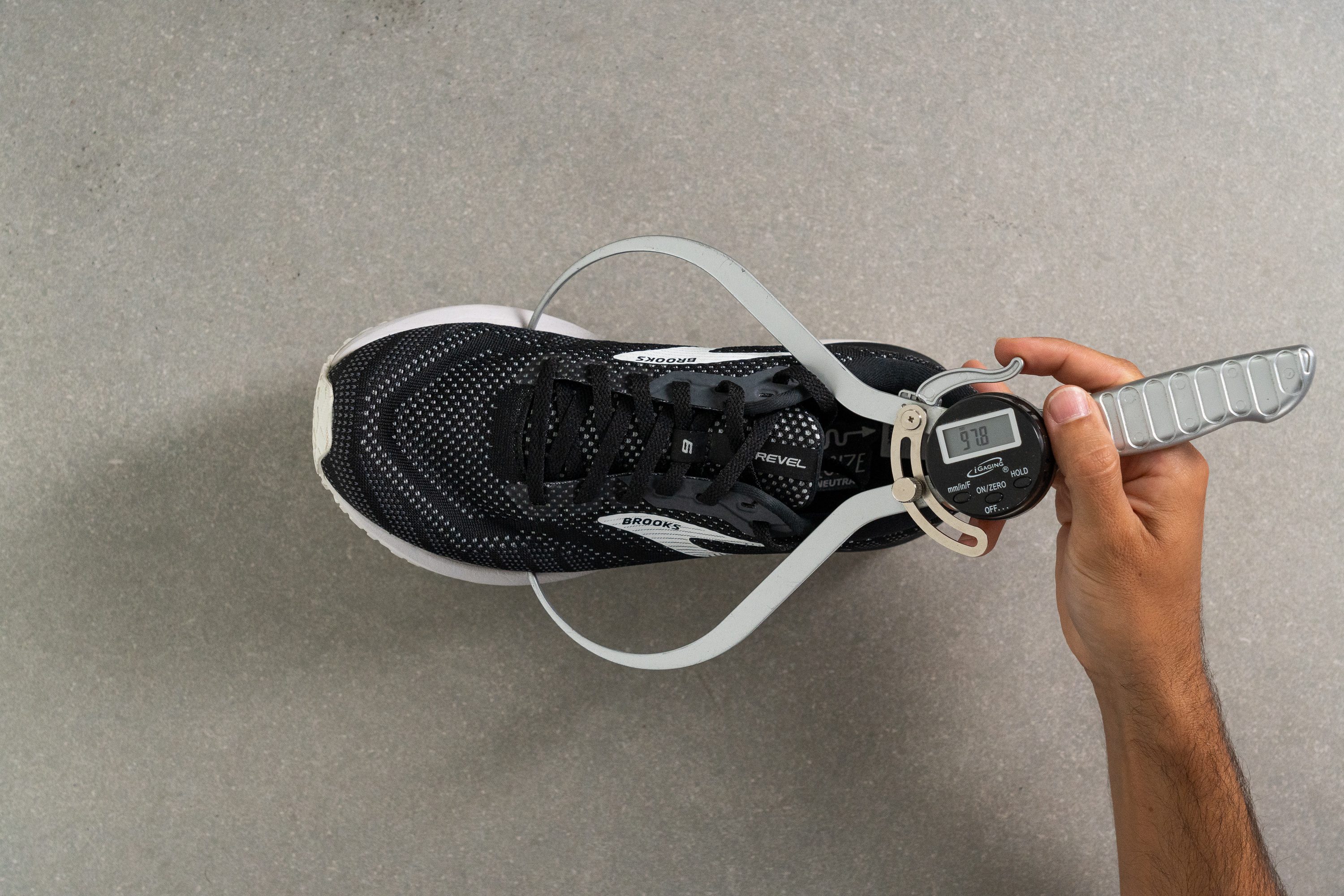
This test follows an older methodology, which is why you don't see recently tested shoes in the chart. Results from different methodologies can not be compared.
| Revel 6 | 97.8 mm |
| Average | 98.5 mm |
Toebox width
Moving to the area around the big toe, we measured the toebox to be 79.0 mm which means that the Revel 6 doesn’t taper towards the toes as much as the average shoe. This gives us plenty of room to splay out naturally during landings without developing troublesome hotspots or blisters along the way.
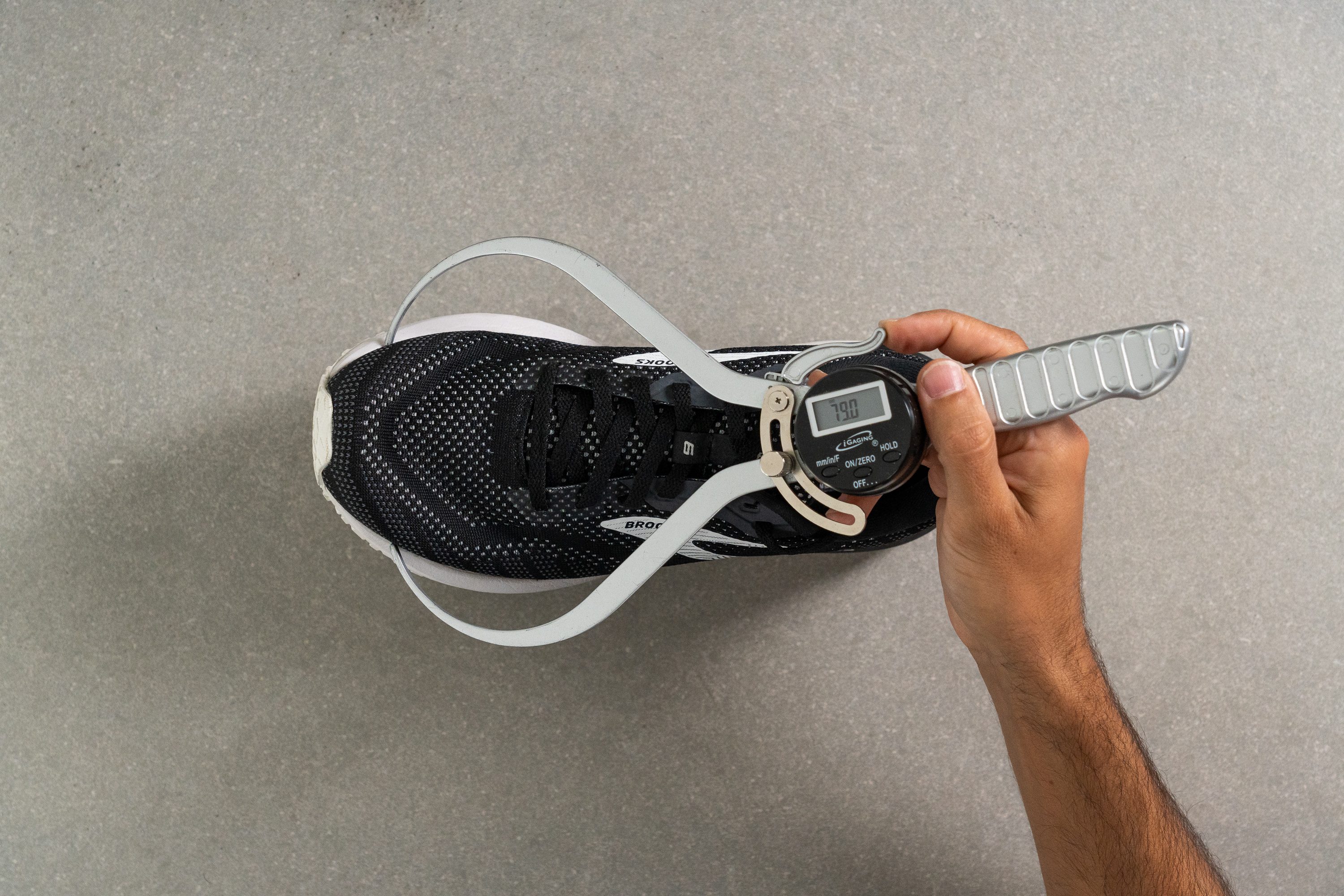
This test follows an older methodology, which is why you don't see recently tested shoes in the chart. Results from different methodologies can not be compared.
| Revel 6 | 79.0 mm |
| Average | 78.4 mm |
Flexibility / Stiffness
To measure the flexibility of the Revel 6, we secured it to our workbench and measured the amount of force required to torque the shoe 90-degrees. With a reading of only 19.2N, the Revel 6 is significantly less stiff than the average shoe. This flexibility factors into the shoe’s comfy ride as it bends with the movement of our foot rather than fighting against it.
This test follows an older methodology, which is why you don't see recently tested shoes in the chart. Results from different methodologies can not be compared.
| Revel 6 | 19.2N |
| Average | 28.1N |
Stiffness in cold (%)
We also repeated the stiffness test after leaving the Revel 6 in the freezer for twenty minutes and found that 28.8N of force was required to bend the cold shoe. This is still markedly more flexible than the average shoe under similar conditions and means that the Revel 6 remains relatively easy and pliable even in harsh and frigid conditions.
Calculating the differential in between warm and cold conditions gives us an idea of the shoe’s consistency. With a 49.9% difference in flexibility based on temperature, the Revel 6 is a little less consistent than the average shoes depending on the weather. As previously mentioned, however, the flexibility score of the Revel 6 means that it will boast a comfy ride all year round.
| Revel 6 | 50% |
| Average | 33% |
Weight
As a budget daily-trainer, we’re not surprised to find that the Revel 6 falls within the average weight range for road shoes at 9.2 Oz (261g). This does mark a gain in weight compared to its previous iteration, the Revel 5, which tipped the scale at 8.7 Oz (247g). While this seems like a step in the wrong direction on paper, the shoe didn’t feel burdensome underfoot during our test runs.
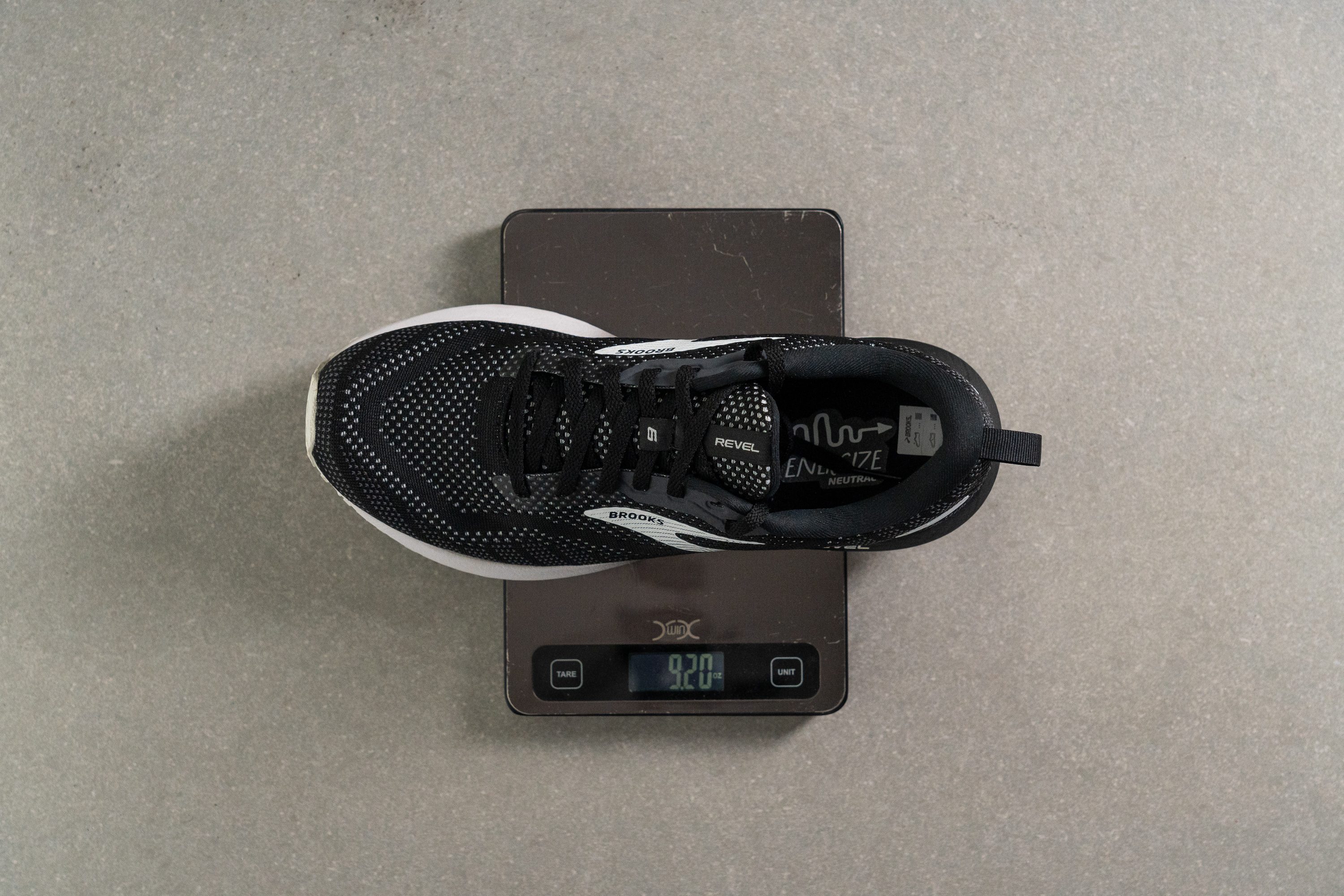
| Revel 6 | 9.2 oz (261g) |
| Average | 9.3 oz (264g) |
Breathability
While the video demonstrates that the shoe is pretty well ventilated throughout, the smoke escapes slowly in thin wisps which leads us to give the shoe a 4 out of 5 for breathability.
When shining a light through a cross-section of the upper, it’s clear to see that the Revel 6 has plenty of gaps for heat to dissipate throughout the upper as well as the tongue. .
Looking at the magnified view of the upper mesh reveals a uniformly woven mesh that facilitates air flow through the shoe.
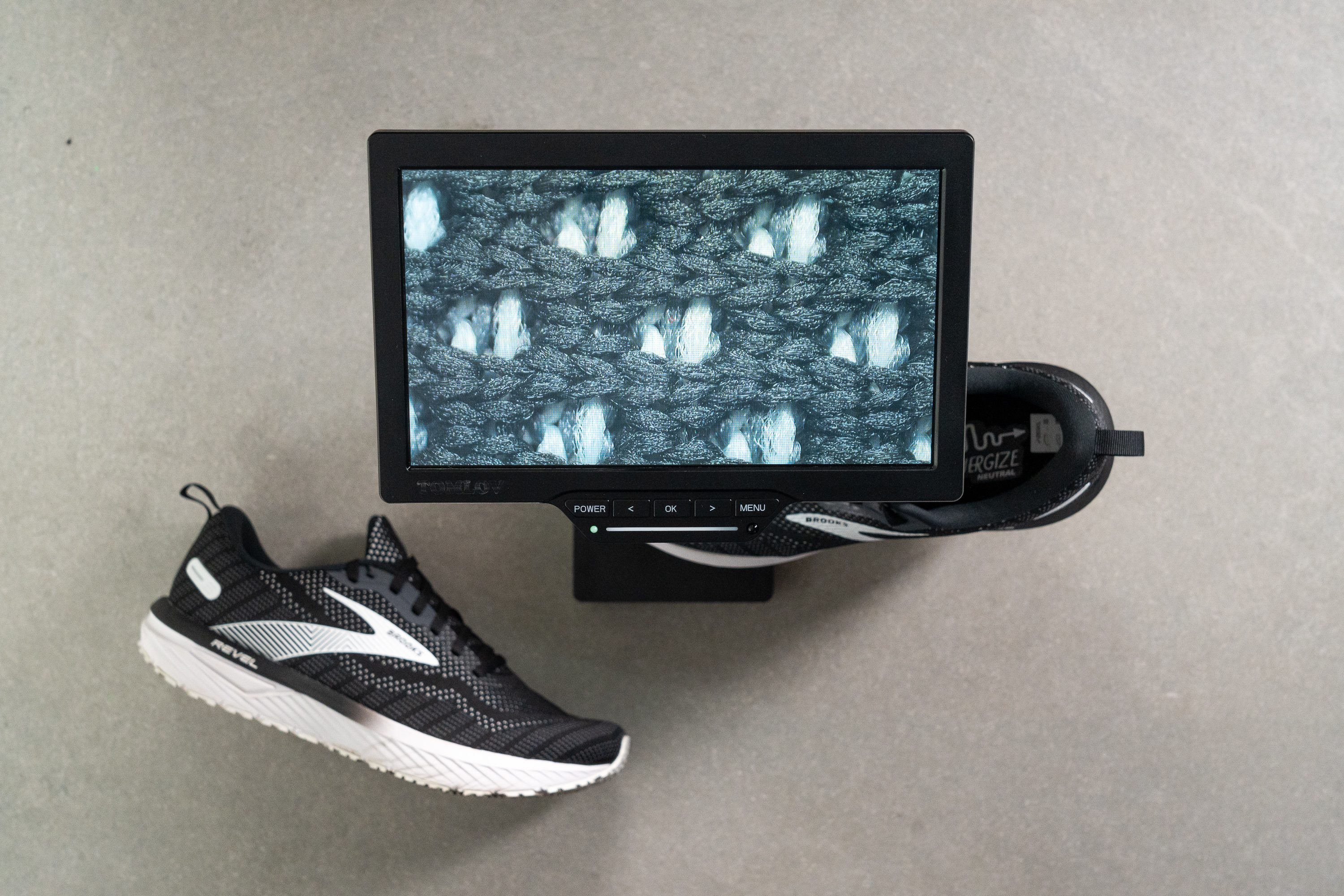
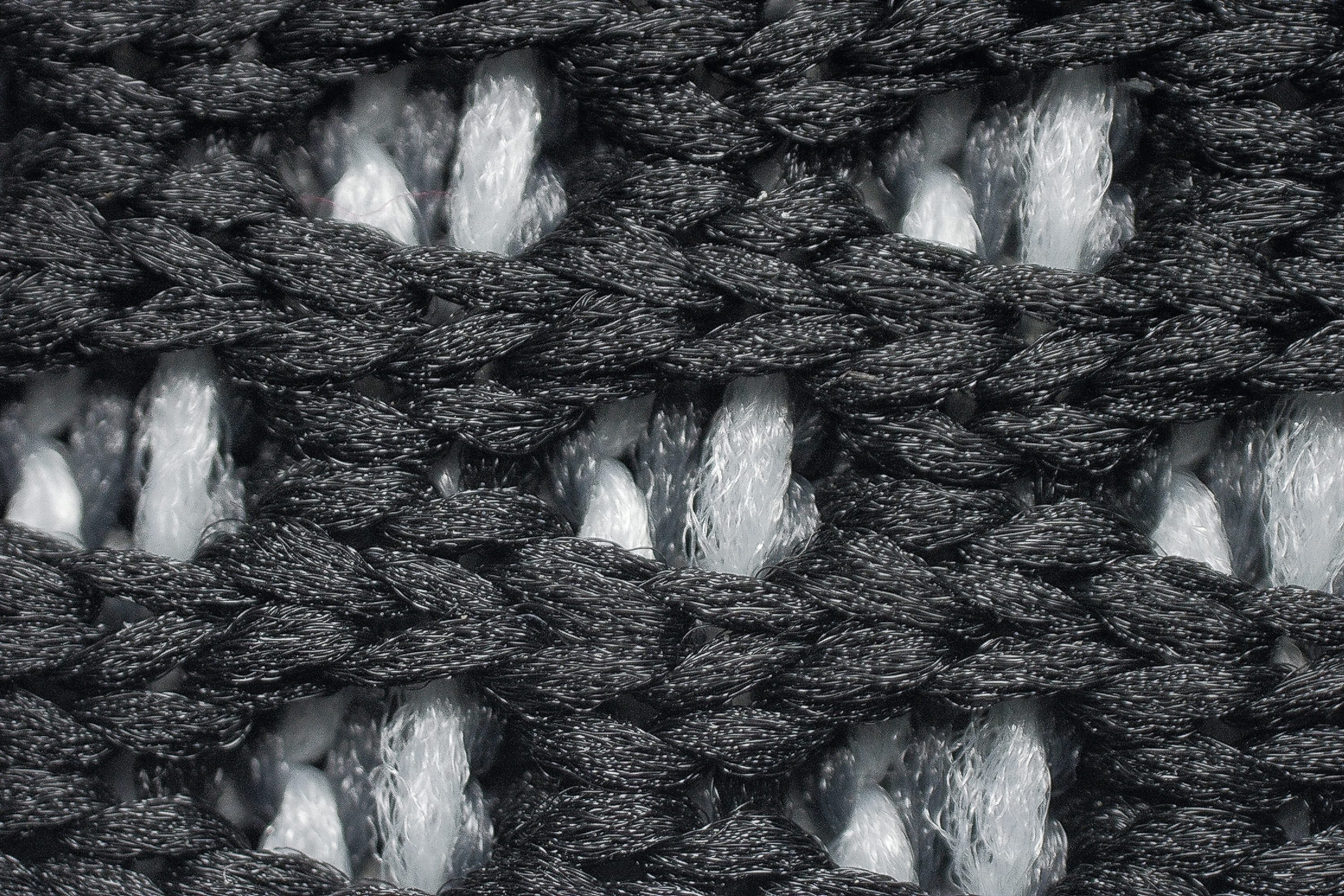
| Revel 6 | 4 |
| Average | 3.7 |
Stability
Lateral stability test
Despite some movement when we shifted our weight from side to side, the Revel 6 feels well planted and stable underfoot. This is better than expected from a shoe with so much soft foam at the heel.
Torsional rigidity
We found the Revel 6 to be quite rigid when we tried to bend and twist it in our hands which led us to give it a score of 4 out of 5 on our subjective scale for torsional rigidity. This level of stiffness helps to prevent lateral movement of the foot and means that the Revel 6 will provide some stability for runners with a pronating stride.
| Revel 6 | 4 |
| Average | 3.5 |
Heel counter stiffness
Further contributing to the shoe’s stability is the stiff heel counter which we also scored a 4 out of 5 for stiffness. This means that the shoe effectively locks our heel in without uncomfortably squeezing it in place, which in turn helps to promote a more neutral stride for runners with mild to pronounced pronating strides.
| Revel 6 | 4 |
| Average | 2.9 |
Midsole width - forefoot
We measured the midsole to be 114.2 mm wide at the forefoot. This is slightly wider than the average shoe and means that the Revel 6 boasts more than enough platform to provide stable forefoot landings.
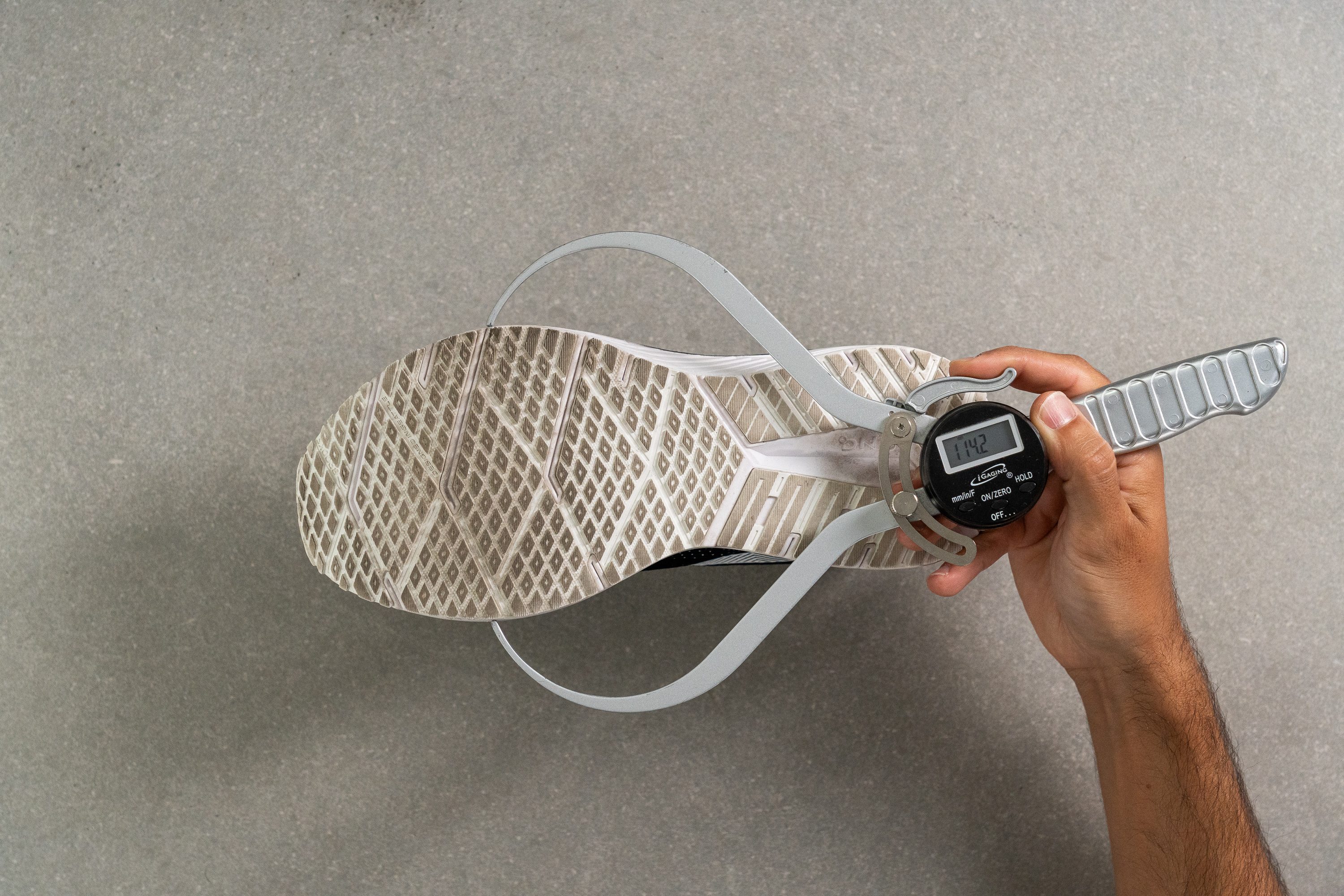
| Revel 6 | 114.2 mm |
| Average | 114.4 mm |
Midsole width - heel
The midsole falls just shy of our lab average at the heel, measuring 88.6 mm wide. This is still plenty of platform to avoid shaky landings for heel striking runners.
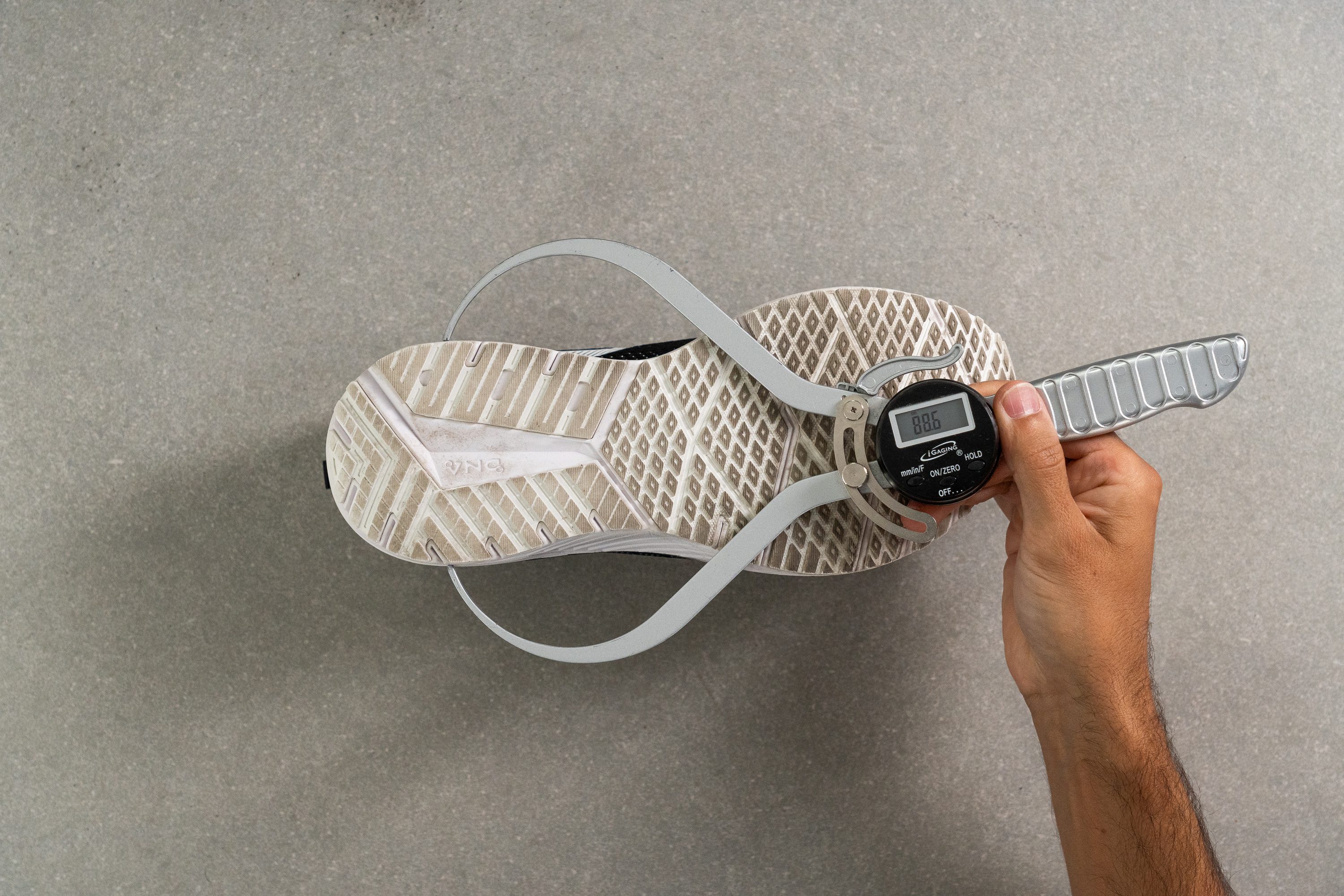
| Revel 6 | 88.6 mm |
| Average | 90.6 mm |
Durability
Toebox durability
We applied our dremel to the toebox at 10K RPM with a force of 3.2N for 4 seconds to see how it holds up. While it appears to hold up for the first second or two, the toebox eventually gave in to our tool’s grinding element which left a rather large hole clean through the delicate upper mesh. We therefore give the toebox a durability score of 1 out of 5.
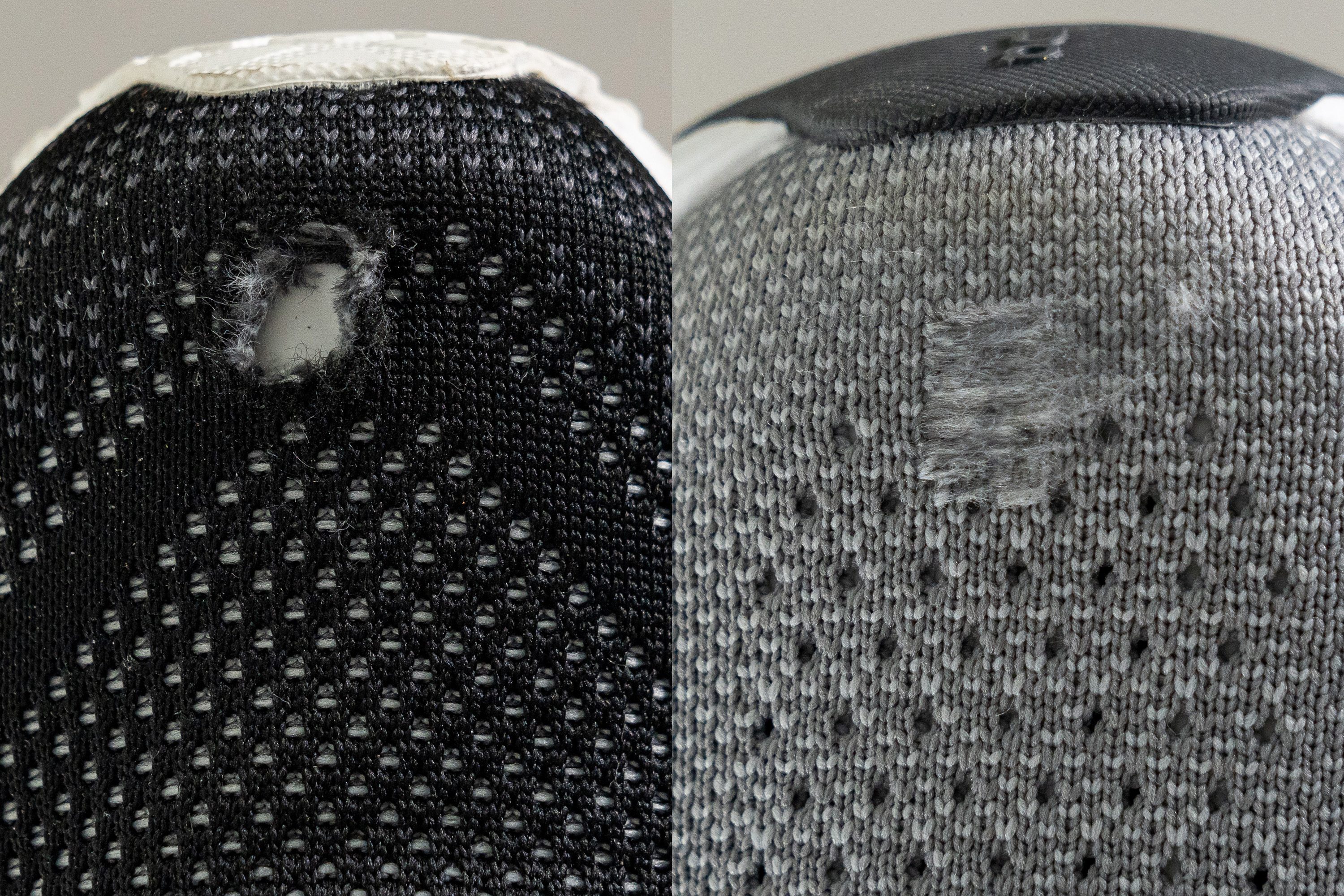
For an example of a more durable toebox, look at how the On Cloudswift 3 fared against our dremel.
| Revel 6 | 1 |
| Average | 2.6 |
Heel padding durability
The heel counter didn’t fare any better in our dremel test. Once the loose shreds of material had settled at the end of the four second test, we found that we had ground our way through all of the shoe’s rearfoot padding. This means that the Revel 6 gets a score of 1 out of 5 for heel padding durability as well.
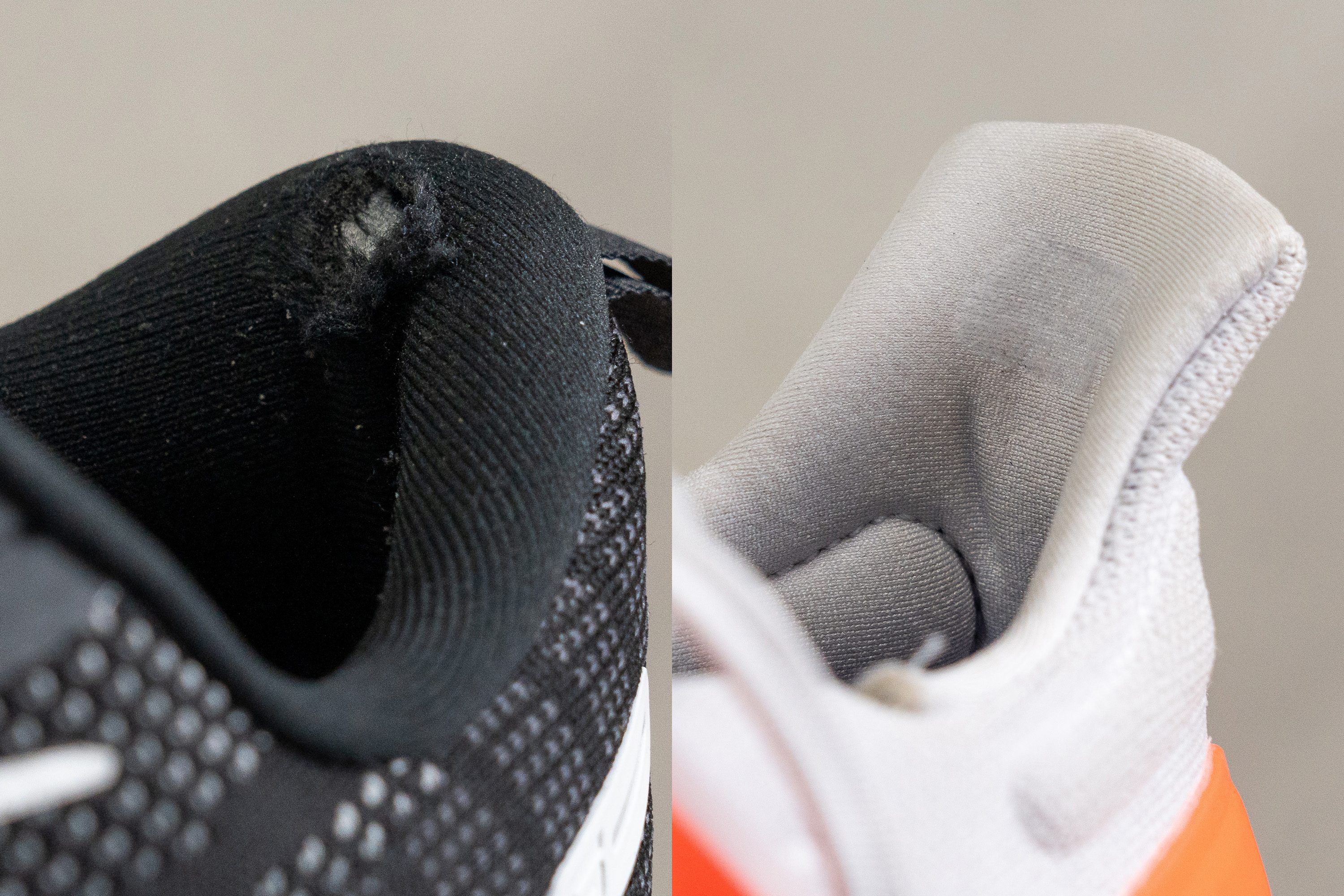
For comparison, check out the Adidas Ultraboost Light's super durable heel counter which barely took any damage in the same test.
| Revel 6 | 1 |
| Average | 3.4 |
Outsole hardness
We used our durometer to measure how hard the outsole rubber is and got an above average reading of 84.0 HC. This contributes to the durability of the outsole while still being soft enough to bite into most surfaces.

| Revel 6 | 84.0 HC |
| Average | 79.2 HC |
Outsole durability
Our dremel didn’t have as dramatic an effect on the shoe’s outsole compared to its upper components. After twenty seconds of grinding the Revel 6 lost only 0.63 mm of rubber, making it significantly more durable than the average shoe we’ve tested so far.
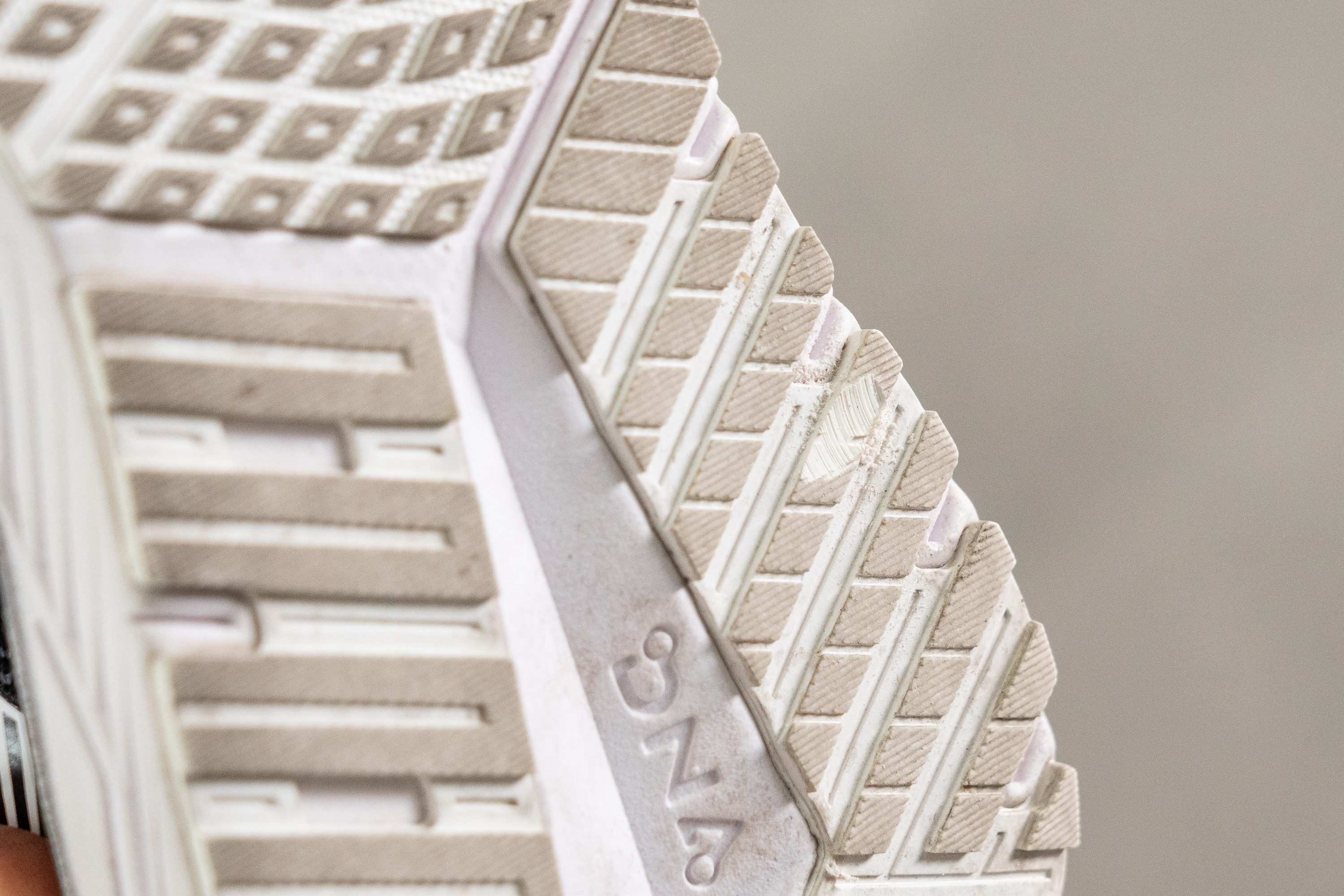
This level of durability leads us to predict that the Revel 6’s outsole should survive well beyond 500 miles of wear and tear. It also means that we didn’t have any second thoughts going off-road when testing the Revel 6, which had us traversing mild trails as confidently as the asphalt.
| Revel 6 | 0.6 mm |
| Average | 1.1 mm |
Outsole thickness
At 3.2 mm according to our caliper measurements, the Revel 6’s outsole is just shy of our current lab average. The strength of the rubber as demonstrated by our previous test, however, means that this doesn’t really factor into the shoe’s durability.
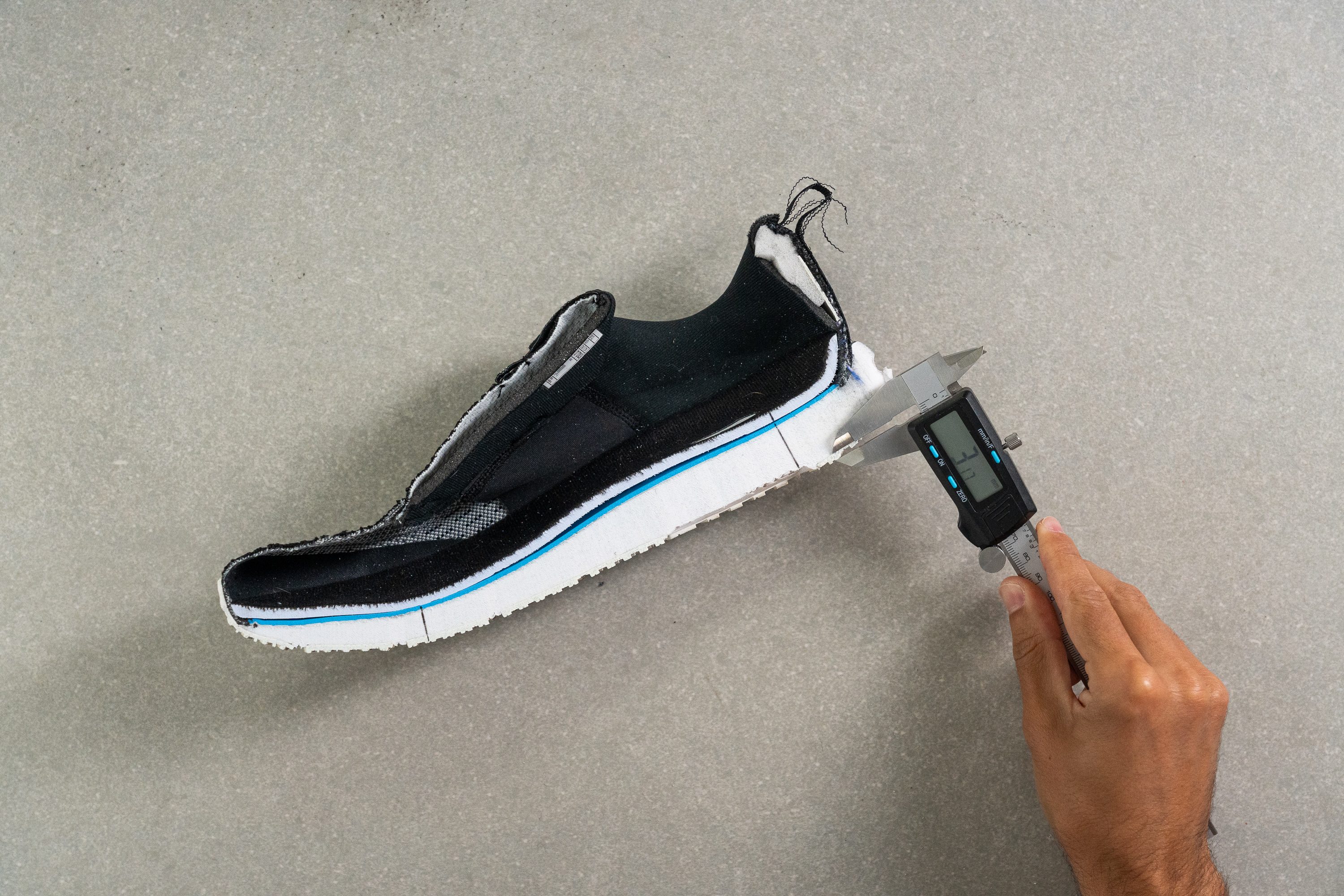
| Revel 6 | 3.2 mm |
| Average | 3.2 mm |
Misc
Insole thickness
The Revel 6’s midsole is just about bang on average at 4.4 mm according to our caliper measurements. This gives us a soft platform that complements the cushioning of the midsole cushioning and provides additional comfort for our foot.
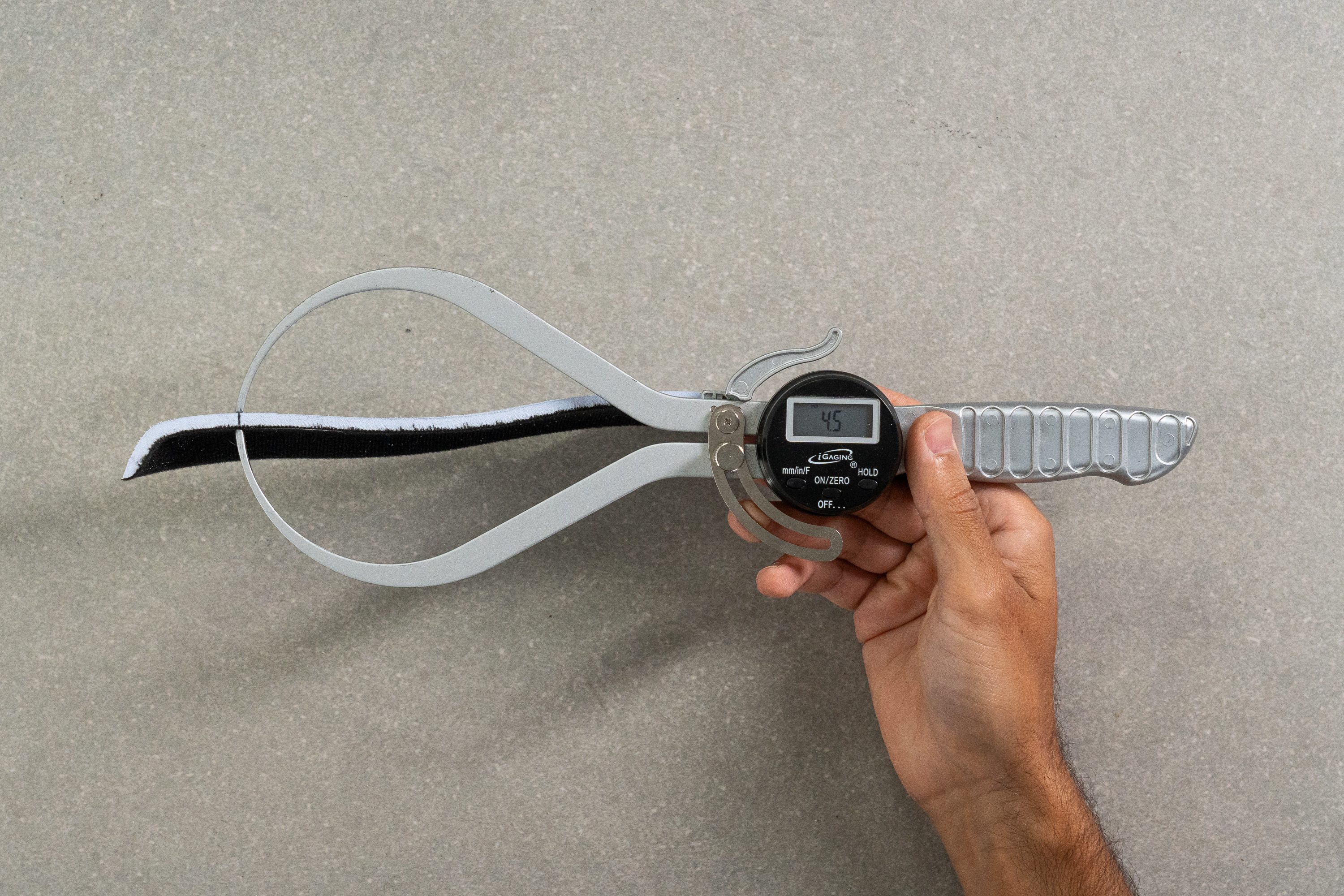
| Revel 6 | 4.5 mm |
| Average | 4.5 mm |
Removable insole
The removable insole means that the Revel 6 is compatible with custom orthotics if necessary.
| Revel 6 | Yes |
Midsole softness in cold (%)
To simulate exposure to cold conditions, we re-measured the softness of the Revel 6 after leaving it in the freezer for twenty minutes and got a reading of 29.5 HA. This is about as firm as the average shoe becomes under the same conditions and means that while the Revel 6 definitely won’t feel as cushy in the winter, it certainly doesn’t become a brick in the wintertime.
While we expect shoes to stiffen up in the cold like most things, with a 46.6% differential between hot and cold, the Revel 6’s midsole does so to a much greater extent than the average shoe we’ve tested so far. This means that the Revel 6 will feel notably different underfoot as the seasons change.

| Revel 6 | 47% |
| Average | 24% |
Reflective elements
With only two small strips at the rear of the shoe, describing the reflective elements as minimal is still an overstatement. We advise sticking to well lit areas when running at night.
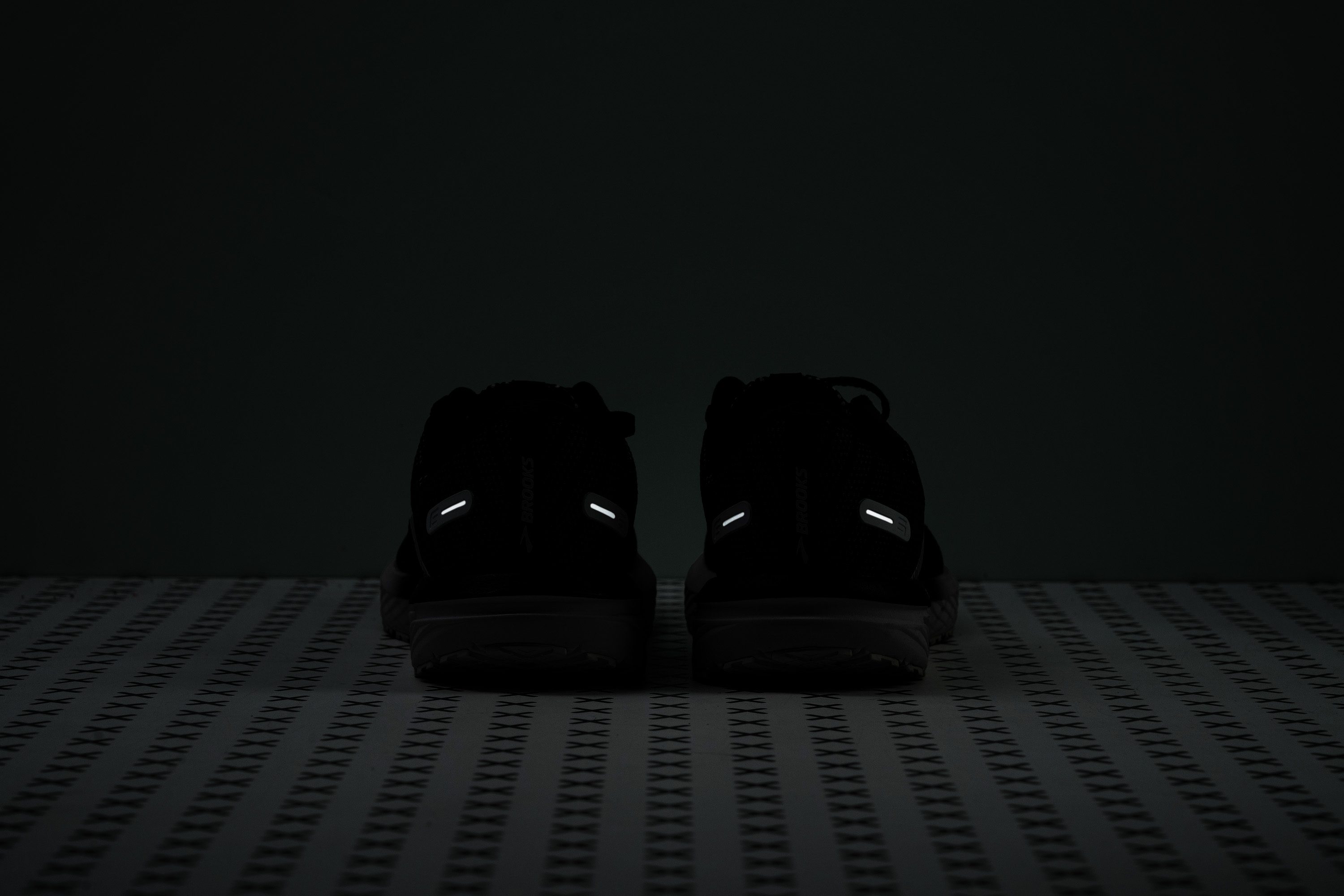
| Revel 6 | Yes |
Tongue padding
We measured the tongue to be 5.4 mm which makes it just about as padded as the average of shoes we’ve tested in the lab so far. This gives us more than enough comfort around the instep and prevents any trace of lace bite once locked into the shoe.
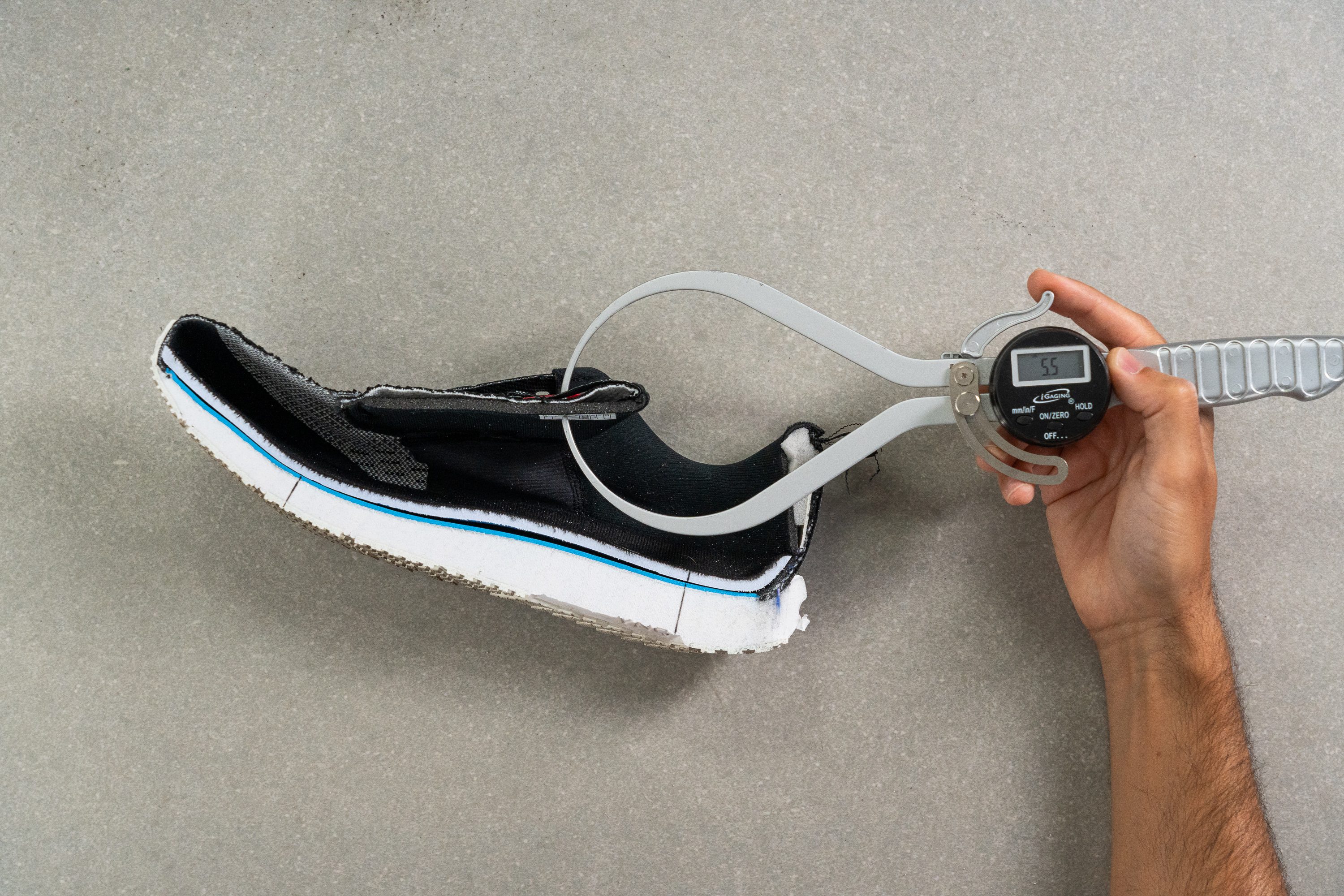
| Revel 6 | 5.5 mm |
| Average | 5.7 mm |
Tongue: gusset type
The tongue of the Revel 6 is non-gusseted, but the lace loop towards the top helps to mitigate any side-to-side slippage.
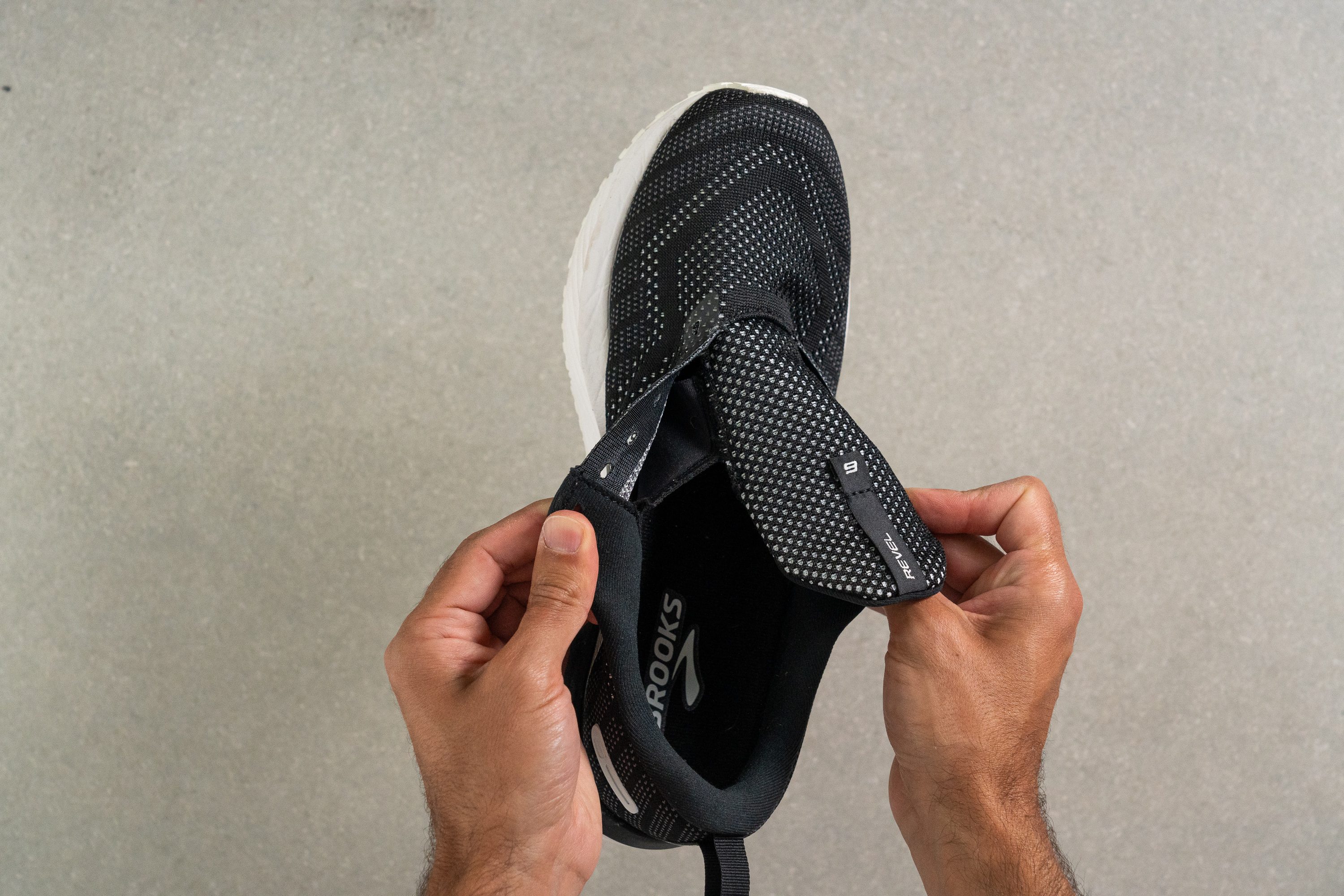
| Revel 6 | None |
Heel tab
The Revel 6 features a finger loop on the heel to assist with pulling the shoe on and off.

| Revel 6 | None |

